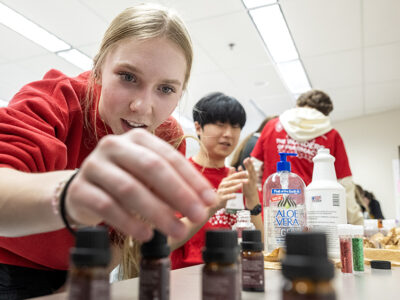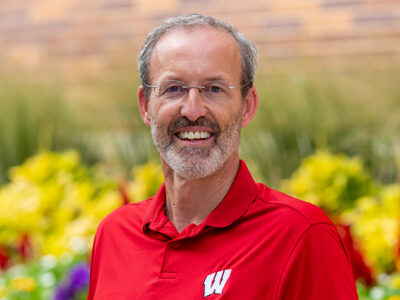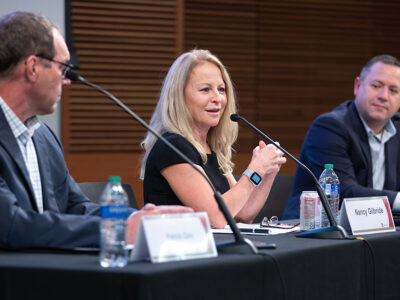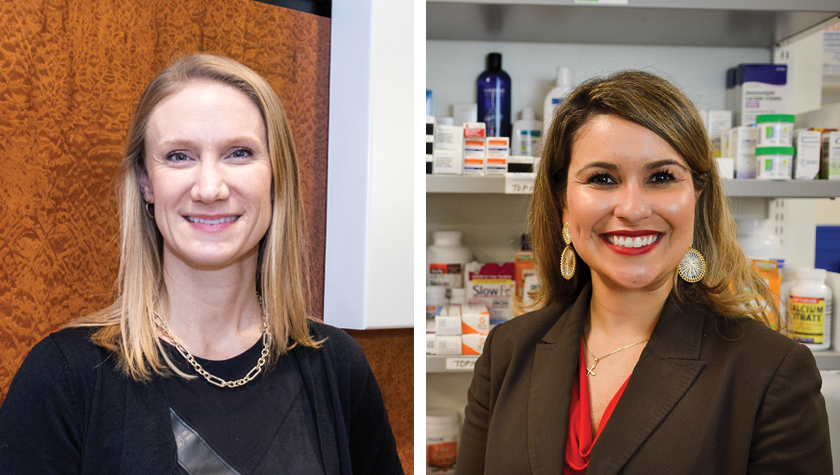
6
December

Erika Smith (PharmD ’06) and Melissa Ortega (MS ’12) are honored for their contributions to health-system pharmacy
By Katie Ginder-Vogel
“I learned very quickly the importance of being involved in the pharmacy profession on an organizational level to influence and impact patient care in parallel with practice,” says Melissa Ortega (MS ’12).
Ortega, system director of ambulatory pharmacy services at Wellforce and Tufts Medical Center, has served the advisory group for the American Society of Health-System Pharmacists (ASHP) Section for Specialty Pharmacy Practitioners and is currently chair of the Section of Community Pharmacy Practitioners and a member of ASHP’s new Racial Diversity, Equity, and Inclusion (RDEI) Task Force. On a local level, she led the Massachusetts Society of Health-System Pharmacists as president from 2018 to 2019 and continues to serve as the Legislative Committee chair.
“It has been an honor to share and exchange ideas with colleagues in the Commonwealth and nationally to move the needle in pharmacy practice,” says Ortega. “I am thankful that ASHP creates venues where we can collaborate and work together to achieve common professional goals and achieve a high level of pharmacy practice excellence.”
A fellow graduate of the University of Wisconsin–Madison School of Pharmacy, Erika Smith (PharmD ’06) has also continually remained engaged with ASHP and leadership since she was a student at the School.
“I am thankful that ASHP creates venues where we can collaborate and work together to achieve common professional goals and achieve a high level of pharmacy practice excellence.”
—Melissa Ortega
After graduation, she joined the Clinical Practice Advancement Section Advisory Group under the ASHP Section of Ambulatory Care Practitioners, where she served on the executive committee from 2018 until 2020.
For all they have both contributed to ASHP, patient care, and the profession by innovating care models and services, Smith and Ortega have been honored as 2021 ASHP Fellows.
“It’s a great recognition,” says Smith, now the director of enterprise care coordination and redesign at Froedtert and the Medical College of Wisconsin. “I had this wonderful evolving experience volunteering with ASHP, so it feels like a nice recognition of that time.”
Erika Smith, Froedtert & MCW
After graduating from the School of Pharmacy, Erika Smith (PharmD ‘06) was drawn to ambulatory care and completed the nationally known ambulatory training residency program at the William S. Middleton Veteran’s Memorial Hospital in Madison.
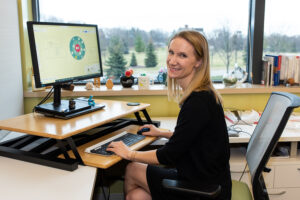
When she first joined Froedtert and the Medical College of Wisconsin, she took a role in an inpatient setting, then soon moved into a combined ambulatory and retail pharmacy position and worked her way up to supervisory roles. She was chosen to develop, pilot and shepherd a new service, Project PRIMED (Pharmacist Reconciliation and Medication Education at Discharge), which leverages pharmacists in a full reconciliation of patients’ medication list prior to their discharge from the hospital.
Smith served as the pharmacist on the floors, trialing the initial workflows on two units. As the pharmacist, she would confer with the physician if there were discrepancies, provide patient education on their updated medication list, and help facilitate prescription pickup from an onsite pharmacy. When the pilot was expanded for a year, Smith trained and supervised two additional pharmacists.
The PRIMED pilot found that 45 percent of pharmacists’ interventions prevented medication errors that could have required monitoring or caused harm, and the program led to an overall increase in patient understanding and satisfaction. In 2011, Project PRIMED won a Best Practice Award from ASHP and helped pave the way for Smith’s career path in health-system leadership.
“That program provided an exciting new level of service for our patients,” says Smith. “Around that time, we were also starting some specialty pharmacy strategies and developing an ambulatory PNT structure, and I got to help lead some of that. That work exposed me to leaders outside of pharmacy and was a huge influence on my career.”
As Froedtert began to invest more in primary care and group practice acquisition, Smith was invited to help redesign care structures to support new models of care.
“That led to another defining moment in 2016: leading the health system in developing the Ambulatory Diabetes Outreach Program (ADOP) that included pharmacists, primary care providers, endocrinologists, certified diabetes educators, and a representative from our digital health accelerator company Inception Health,” Smith says. “We were tasked with designing a new care model and identifying a digital solution that could support clinicians and patients in the management of diabetes. It has been very successful at demonstrating an impact on lowering A1C during the active episode of care provided by pharmacists and certified diabetes care and education specialist RNs and, more excitingly, it demonstrates that those gains are largely sustained, even after the program concludes.”
The team has managed over 6,800 patient episodes since its inception, and the project got Smith thinking about different care team member roles and an enterprise structure vs. a primary care-oriented structure.
Smith moved into her current role in care coordination and redesign in 2018, focusing on care coordination across the Froedtert enterprise, as well as digital therapeutics and patient education, to promote optimal patient care delivery and strategic leadership to improve patient experiences. She is passionate about care delivery model design, which involves bringing different perspectives together and using data to make decisions, and she draws upon her clinical background to keep patients and care providers front and center.
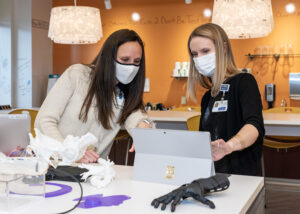
“I’m pushing for innovation on a human scale, leveraging patient voices,” she says. “I want to solve problems for patients, not just for healthcare.”
Now that Smith has moved into a leadership role for the entire Froedtert enterprise, she’s mindful of the need to include pharmacist perspectives in areas beyond pharmacy as well as non-pharmacist perspectives within pharmacy.
“It goes back to leveraging a diversity of perspectives and experiences and the clinician voice in leading health systems,” she says.
Smith cites her fourth-year rotations as a PharmD student at the UW–Madison School of Pharmacy — where she saw different care models in her ambulatory, retail, and administrative rotations — as elemental in sparking her interest in innovative care models.
“Mike Grunske (BS ’97, PharmD ’98), who was my preceptor at Aurora Family Medicine Residency, offered us a cool example of a new model of care and education of trainees,” she says. “The experience was in a physician family medicine residency training program, so it was an exceptional blend of exposure to provider education, provider models of care, as well as developing the role of a ‘primary care pharmacist,’ in terms of independent services.”
Smith plans to continue to advance as a leader, maximizing her learning and her ability to deliver value to patients.
“I want to continue to work on advancements like innovative care models, digital tools, and education, to support clinicians and how they care best for their patients,” she says. “I plan to keep finding new ways to engage with clinicians and position the patient as both a consumer and a patient.”
Melissa Ortega, Wellforce & Tufts Medical Center
Melissa Ortega (MS ‘12) followed her interest in pharmacy leadership, team-building, and program development to the School of Pharmacy’s master’s degree and residency program in health system pharmacy administration. Ortega was drawn in by the program’s patient-centered approach and development of leadership skills.
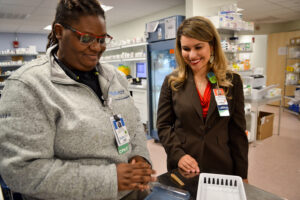
“I love how much the UW–Madison School of Pharmacy is invested in your growth and development,” she says of her graduate school experience. “They’re really passionate and excited about innovation — about making you a really good pharmacy leader.”
Ortega has worked at the Tufts Medical Center since graduation, starting as a manager within the central pharmacy at Tufts Medical Center, where she oversaw medication use processes for acute care. Now, she leads ambulatory, specialty, and retail pharmacy services for the entire health system, which includes Tufts Medical Center, MelroseWakefield Hospital, and Lowell General Hospital.
Through her nine years with the Tufts Medical Center and the Wellforce Health System, she has created a team-based technician model in which technicians act as pharmacist extenders; enhanced the sterile products area services; and expanded pharmacy services to cover the pediatric, emergency medicine, nephrology, pediatrics, primary care, endocrinology, and pulmonary departments.
“I’ve been able to build on what I saw and learned at the University of Wisconsin here at Tufts Medical Center,” she says. “I’m really proud of what I’ve accomplished. I’ve made patient care more effective by implementing different technologies and by starting clinical programs.”
Ortega has long been active in ASHP, which she views as a place to network, learn about best practices, give back to the profession, and contribute to the advancement of pharmacy practice. She has long contributed to the ASHP Sections for Pharmacy Practice Leaders, including as faculty of the ASHP Manager’s Boot Camp, chair of the Education Committee, and a member of the advisory group. She led the ASHP New Practitioners Advocacy Advisory Group, served on the Council for Public Policy, and is excited to be a member of ASHP’s new Racial Diversity, Equity, and Inclusion (RDEI) Task Force.
“The task force was able to come up with recommendations in different domains and areas,” Ortega says. “Our work includes acknowledging the need to really mentor minorities through the profession, have a diverse workforce that represents the patients that we’re caring for, and bring different perspectives and backgrounds to the decision-making process.”
Ortega also serves on Tufts’ Diversity, Equity and Inclusion Committee, where she’s drawn upon what she has learned from the ASHP RDEI task force, including ideas for education and workforce training.
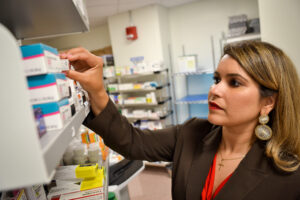
“I’ve been very fortunate to carry on that work within the Tufts Medical Center, where we’re really just starting our journey,” she says. “It’s been nice to lean on the framework that we’ve developed on the ASHP task force, bring back ideas, and incorporate them as part of the Medical Center’s DEI committee.”
As chair of the ASHP Section of Community Pharmacy Practitioners, Ortega gets to cultivate her interest in community practice.
“Community practice is really dear to my heart,” she says. “When we think about our patients, they have a lot of connection and touch points with our community pharmacy providers, and there’s just so much to think about with regard to how that fits into advancing the profession and how that fits into the care of our patients.”
Ortega thinks the new section provides a professional home for many community pharmacists and technicians.
“We’ve just started our journey as a section, so I’m excited to see that evolve over the next couple months and what our focus areas are going to be,” she says.
Looking forward, she hopes to continue influencing patient care and advancing the pharmacy profession locally and nationally.
“What gets me out of bed in the morning is my team and the care that we provide,” she says. “What motivates me is the opportunity to develop programs and build new ways to advance pharmacy practice, empower our pharmacy team, and improve the care we provide our patients. That’s what keeps me going.”





